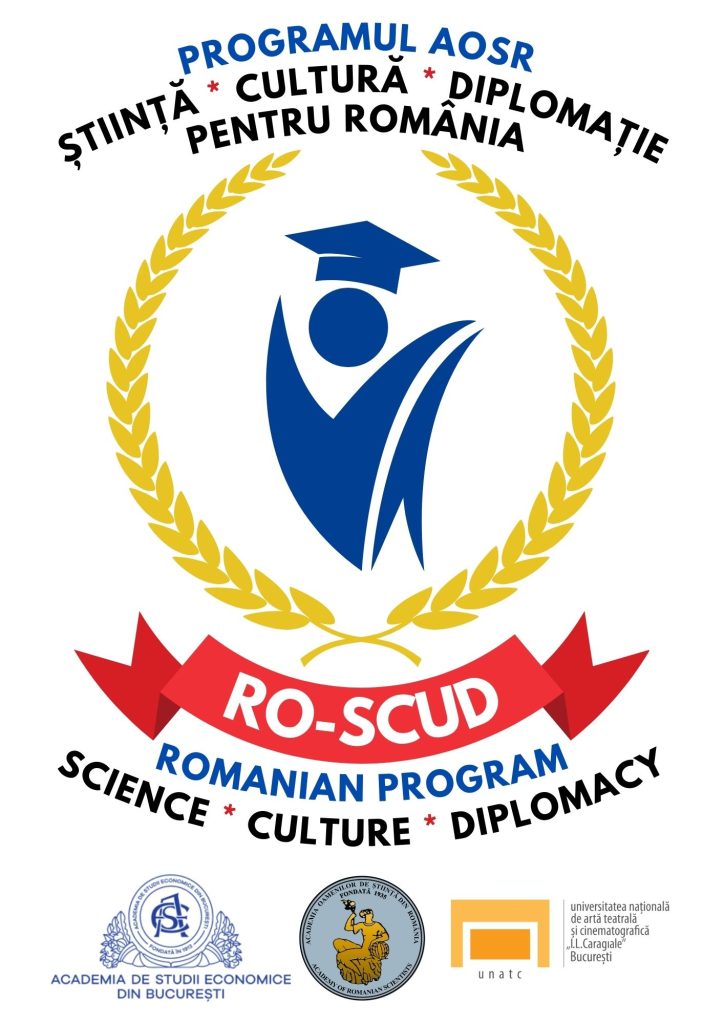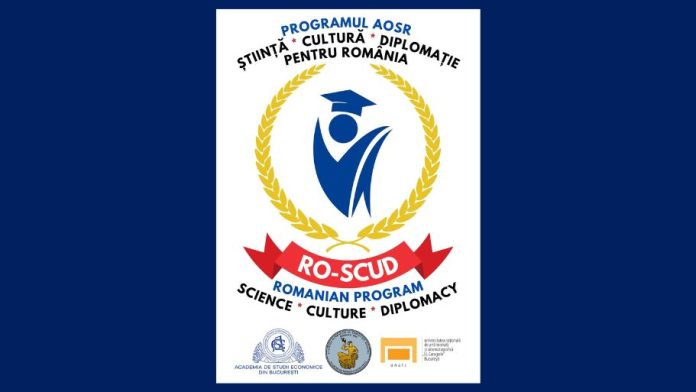Program initiated by the Academy of Romanian Scientists together with the Academy of Economic Studies of Bucharest and the National University of Theatre and Cinematographic Art “I.L. Caragiale” Bucharest
AOSR Science-Culture-Diplomacy Program for Romania
ROmanmanianprogram Science– Culture– Diplomacy(RO-SCUD)

ARGUMENT
The year 2025 may set the stage for profound and complex changes in humanity’s existence, globally, regionally, nationally and, by extension, in the lives of citizens everywhere.
The overlapping of crises – energy crisis, economic crisis, social crisis, institutional crisis, diplomatic crisis – generated by conflicts of all kinds, combined with the digital transformation of society due to the expansion of technology and the new paradigm of politics, from collaborative democracy to democracy of power (identifying and highlighting the influence of national components in global developments), leads to often unpredictable effects, which can in turn generate serious deviations in the existence of mankind.
Identifying and highlighting the influence of national components in global developments is becoming a concern and an obligation for recognizing the status and strength of a nation. They are the national vectors capable professionally, intellectually and in terms of relationships of positioning a nation among those that have a say in the world.
Throughout human history, it has been shown that Science is the main factor driving evolution. The industrial revolutions – from the discovery of the steam engine in the 18th century to Artificial Intelligence in the 21st century – have influenced economic and social development, inter-human relations, institutional relations, inter-state relations.
Culture, in all its forms, has evolved with society and has sought to empower the human spirit and be a basic component in the evolutionary process. Culture, nowadays, associated with various attributes, encompasses the whole socio-economic and political life of a society: musical culture, literary culture, artistic culture, civic culture, economic culture, political culture, diplomatic culture, digital culture, etc.
Diplomacy has also broadened its scope. There is talk of economic diplomacy, political diplomacy, cultural diplomacy (in a fruitful dovetail between diplomacy and culture), cyber diplomacy, but above all alternative diplomacy, which must support traditional diplomatic efforts.
The fundamental pillars of foreign policy will remain the same, but they can be creatively and beneficially complemented with new directions and new partnerships that can be harnessed to the benefit of common interest.
Scientific cooperation, collaboration between educational and cultural institutions, the presence of Romanian elites all over the world have created and can continue to create bridges for significant, sustainable and durable economic development. These are areas where there is the advantage of continuity, tradition and geographical proximity, where projects can be developed with tangible benefits for significant, sustainable and lasting economic growth of the countries. Romania can be an effective pillar both in the Balkans, alongside the other countries in this part of Europe, and in the European and global context.
Science, Culture and Diplomacy (SCUD) can have a determining role in Romania’s positive positioning.
Academies, educational institutions, research and cultural institutions in any country have the vocation to contribute actively to the development of the society in which they exist, each in relation to their specific role and tasks.
In the 21st century, digital communication has intervened in all processes, facilitating cooperation, collaboration, but above all information and knowledge.
SCUD Program – Science-CUlture-Diplomacy
The objectives of the AOSR, as stipulated in the founding law, are “the conception, promotion, development, support and protection of science in all its direct, indirect or adjacent forms, actions and methods”.
In carrying out its tasks, “AOSR collaborates with the academies of the branch, with the Ministry of Education and Research, with academic, research and educational scientific institutions and organizations, in the country and abroad[1]“.
To this end, the AOSR is developing two major programs of national interest: the Digital Transformation in Science and the Romania Knowledge Program, launched in 2024.
In addition to this, the RO-SCUD Program mainly aims to carry out activities to achieve the following objectives:
- to capitalize, in a systemic approach, the results obtained through the scientific actions carried out by the AOSR,
- to disseminate through all means and forms of expression successful initiatives and important achievements,
- to promote the personalities of Romanian scientific and cultural life, regardless of their age,
- initiate and support programs and projects of bilateral, regional, European and global interest,
- to support the objectives of RO-SCUD through bilateral and multi-institutional partnerships at national and international level,
- to bring back and consolidate in the national and international consciousness the authentic Romanian values, which have contributed to the development of science and culture at national and international level.
The implementation of the Program will be done through focus groups such as ”think tank”[2]to which specialists from other research, educational and cultural institutions will be invited. The Program will also involve young researchers whose projects have been funded by the AOSR.
[1] LAW no. 31 of January 15, 2007 (*updated*) on the reorganization and functioning of the Academy of Romanian Scientists, ART. 4: In the performance of its duties, the Romanian Academy of Romanian Scientists recognizes the Romanian Academy as the highest national forum of scientific and cultural consecration and collaborates with the academies of the branch, with the Ministry of Education and Research, with scientific, academic, research and educational institutions and organizations, in the country and abroad.
[2] Think tank


